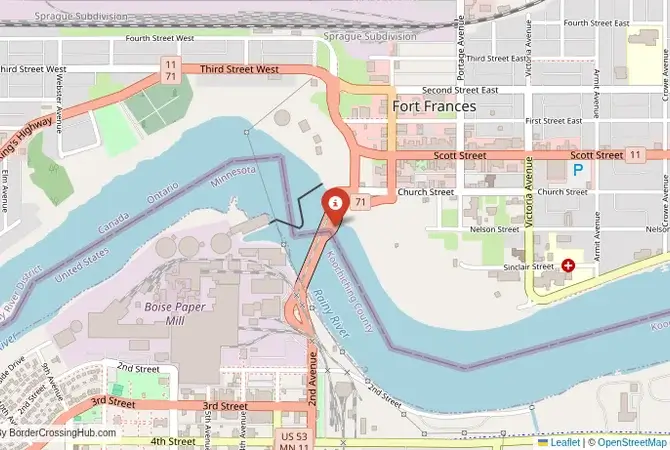
Approximate Border Location
Border Countries
- 🇺🇸United States
- 🇨🇦Canada
Border Cities
- 🇨🇦Fort Frances, Ontario
- 🇺🇸International Falls, Minnesota
Wait Times
15-60 min for pedestrians/vehicles
Just crossed? Tap to report:
Operating Hours
Open 24 hours
Crossing Types
Pedestrians, vehicles, commercial
Border Type
Land crossing via road
Peak Times
Mornings (7-10 AM), weekends
Daily Crossings
~4000 travelers/vehicles
Currency Exchange
Available near International Falls (USD, CAD)
Safety Information
Generally safe, river area
Languages Spoken
English
Accessibility Features
Ramps, elevators
About Fort Frances, Ontario & International Falls, Minnesota
Monthly Update (February 2026):
The bridge fills gradually as the day goes on at the Fort Frances, Ontario & International Falls, Minnesota Border Crossing. Lately, into February 2026, the rhythm has been mostly stable, though vehicles entering the U.S. can stack up mid-afternoon. Early hours stay lighter. Weather and local events set the tone.
Warning
The Fort Frances, ON – International Falls, MN border crossing, also known as Rainy River Border or Fort Frances Bridge, remains organized; stay vigilant with any unofficial services and consult government sources for accuracy.
Straddling the Rainy River, the Fort Frances, ON – International Falls MN
Border connects Ontario’s Rainy River District with Minnesota’s Koochiching County via the International Bridge. This bustling crossing, a key link for tourists and truckers, draws adventurers to Ontario’s lakes or Minnesota’s northwoods, offering a blend of natural beauty and cross-border commerce. Its proximity to Voyageurs National Park makes it a popular route for outdoor enthusiasts.
Historical and Geopolitical Context
Formalized in 1912 with the bridge’s construction, this border grew from a trading post for fur and timber, rooted in the region’s Ojibwe heritage. The area’s economic ties strengthened through the 20th century, with pulp and paper industries driving cross-border trade. No major tightenings reported in late 2025–2026; occasional delays possible from inspections. The border’s role in regional commerce, moving goods like lumber and minerals, underscores its importance. Checking news for border status is prudent, as labor disputes or inspections can disrupt operations.
Crossing Procedures and Wait Times
Open 24/7, the border handles moderate traffic, with waits typically no delay or minimal as of January 2026 (real-time via CBP/CBSA sites). U.S. immigration in International Falls, located at the bridge’s south end, processes exit stamps; after a short crossing, Canadian immigration in Fort Frances handles entry. Travelers require a valid passport or approved document for entry. Carry your passport, vehicle registration if driving, and proof of insurance. NEXUS lanes for pre-approved travelers may have specific hours; confirm via U.S. Customs (218-283-2541). English is widely spoken, though French may appear in Fort Frances. Real-time wait times are available on U.S. Customs’ website, helping you plan your crossing.
Scam Awareness
Scams are uncommon but present. Money changers near the bridge offer poor rates; use ATMs or banks in International Falls or Fort Frances for better exchanges. Taxi drivers may inflate fares (~$15-25 USD) for short trips; negotiate upfront. Avoid unofficial “customs helpers” offering paperwork assistance, as they’re unnecessary at this organized crossing. Duty-free shops are legitimate but compare prices to avoid overpaying. Some travelers report unofficial guides offering border tips; politely decline and stick to official counters.
Transportation Options
Buses from International Falls to Fort Frances run infrequently, so check schedules at local terminals. Taxis (~$20 USD) or private cars are more reliable, taking 5-10 minutes across the bridge. From Fort Frances, buses to Thunder Bay (4 hours, ~CAD 60) connect to Ontario’s broader network. The bridge allows pedestrian crossings, but town centers are 1-2 km away, making vehicles preferable. Roads are paved and well-maintained, offering scenic views of the Rainy River and surrounding forests. Winter ice can slow travel, so check Minnesota’s 511 system or Ontario’s equivalent (800-268-4686). The route’s calm waters and occasional wildlife sightings add charm to the journey.
Nearby Attractions and Tips
International Falls’ Smokey Bear Park celebrates its firefighting history, while Fort Frances’ Lookout Tower offers panoramic river views. Voyageurs National Park, 40 km south, is a haven for kayaking and fishing, with boat tours showcasing its pristine lakes. In Fort Frances, the Hallett House Museum highlights Ojibwe culture and local history. Carry USD or CAD, as border ATMs may be unreliable, and small businesses prefer cash. Stay in International Falls for more lodging options, like motels along Highway 11/71. A Canadian SIM card ensures connectivity, as U.S. signals weaken north of the border. Book outdoor activities, like fishing charters, through reputable operators in Fort Frances to avoid inflated prices.
Seasonal and Weather Considerations
Summer (June-August) brings warm weather (20-27°C) and heavier tourism, potentially increasing wait times during weekends. Winter (December-March) delivers snow (-15 to 0°C) and icy roads, requiring winter tires; check conditions via 511 services. Spring and fall are quieter but rainy, so pack waterproof gear. Peak holidays see more traffic, so cross early to avoid delays.
Planning Your Crossing
Bring a valid passport or NEXUS card, vehicle documents, and cash for small transactions. Use official transport and check wait times online or by phone. This crossing connects you to Ontario’s lake country or Minnesota’s wilderness, blending natural splendor with practical border travel.
No reviews yet.
